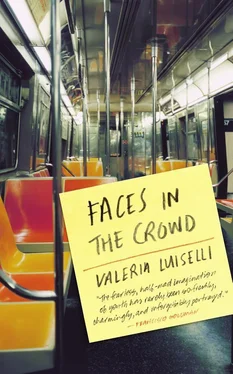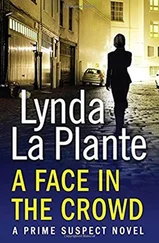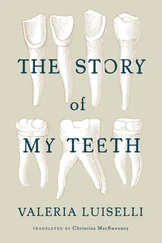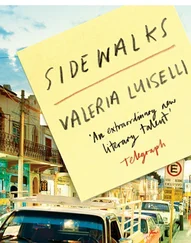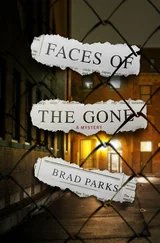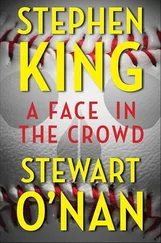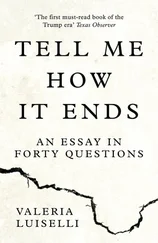When we were near the stock exchange, Iselin pointed to the sky: a man was leaning out of a window. At that very moment we saw him jump. Or, perhaps, only loosen himself, let himself go. The body fell slowly, at first — almost a bird suspended in flight. But before we could avert our eyes, a hat was rolling toward our feet, a shoe stuck in a sewer vent, a leg separated from the rest of its body, the ginger-haired head shattered on the sidewalk. Iselin grabbed my arm and sank her face into my shoulder. Slowly, we continued walking to get as far away as possible from the crowd, which was now forming a circle around the fallen man.
Then I saw Federico. He was sitting on the edge of a bench, euphoric, with a small book in his hand, making notes. We went up.
What can you be writing now, Federico? I asked.
He looked up like an automaton.
I haven’t been able to write anything, Mexicanito, only one line: “Murmurs in the Financial District. .”
So what are you doing here?
Well, according to me, I threw myself from the top floor of that building, but it seems I was hallucinating because here I am, talking to you.
I’d like to introduce Iselin.
Who?
Iselin.
What are you talking about, Mexicanito? Are you seeing your subwankers again?
*
There are sweet tamales for dinner. The children’s father is upstairs watching television while the children keep me company in the kitchen. The baby plays with a saucepan in her highchair. The boy helps me lay the table (three place mats, big plate, small plate, knife, fork, two glasses, and a plastic tumbler).
If you want, I can drink from a grown-up glass now, he says, and for the first time I let him.
The baby is hitting the saucepan with a spoon when we start to feel it. Maybe, first, just a sort of presentiment, a very slight dizziness. Next, the internal and then external shuddering of objects. We turn to look, as if to confirm what we are all witnessing. Trembling. Everything trembles, the house creaks, the glasses fall from the shelves and break into so many pieces that the light of the only bulb is multiplied again and again throughout the whole of the kitchen. In some way, that light show is beautiful. The baby laughs. We hear books falling in the living room, first a few and then a cascade. And then nothing. An unfamiliar kind of stillness.
I take the baby from her chair and the three of us get under the table. The electricity cuts out. We stay there, holding each other, under the laid table, silently watching the ring of the stove, where the tamales are still heating up.
We see a Madagascar cockroach silhouetted in the flame.
Pa-pa, says the baby.
It’s the only thing she can say. Trembling again, this time stronger.
Pa-pa, says the baby, and laughs.
*
Today the children left for Europe with their mother. It was a busy day at the office, so I didn’t manage to call them to say good-bye. I issued four passports and signed nine tourist visas. I also received a complimentary photo from the night of the ballet. I quite simply wasn’t there. It wasn’t that I was out of shot — instead of my body, there was a shadow, an empty space smiling at the camera. I marked my shadow with an X, and went over to Chela’s desk to see what her diagnosis was.
Can you see me, Chela?
Of course I can, sir!
No, see me here, in the picture.
No, you’re not there, sir!
Was I there when they took this photo?
I can’t remember, sir. But don’t I look horribly fat next to José Limón!
*
As soon as we’re sure the trembling has stopped, we get out from under the kitchen table and head toward the front door. I tug at it, but it’s jammed. Nor can we go up to the second floor. I imagine it has been blocked off by the part of the roof that fell in. My husband is there, though we can’t hear him, so maybe he’s not. Maybe he never was there. We go back to the kitchen, I’m carrying the baby, and the boy is holding my sweater sleeve. There’s no running water or gas. But there is a little water left in the saucepan in which we were heating the tamales.
*
I left the office a little early to go to a photographic studio. I wanted to have a professional portrait taken so I could send a copy to the children, when their mother calls from some European city with an address. And I just wanted to see whether I’m going mad or blind, or whether I had, in fact, somehow been rubbed out of the other picture. I don’t think I’m going blind. In fact, I think I’m going unblind. But at the same time, I’m disappearing and certain things are being replaced by shadows. Anyway, the owner of the studio sat me on a stool, adjusted it to my height, and asked me to choose between Italian, Swiss, and tropical backdrops. I opted for the Italian, though I’ve no idea what an Italian backdrop should look like. She made a first attempt, and a second. She readjusted the height of the stool, tried again. She changed the backdrop. At the fourth attempt, she apologized.
I can’t take your portrait, sir, something’s wrong with our equipment. You can pay now and come back in a few days.
Why should I pay if you haven’t given me my picture?
I think you should pay, sir.
Fine, I’ll pay.
*
We also have access to the living room, which connects directly to the kitchen through an arch. The children and I wander like three cats through the jumble of books and other objects, picking up things that have fallen, that fall, and go on falling.
*
After the incident at the photographic studio, I stopped off at the supermarket and bought a packet of biscuits, a can of milk for the cats, and a bottle of whisky. As I was paying, the thought crossed my mind that, the night he cracked up, Scott Fitzgerald had bought whiskey, with an e . I wasn’t going to pack a case or go anywhere; I walked home. He had packed a bag and left, driving a convertible, without any set destination. It’s easy to imagine that, after hours driving along the pitiless monotony of the highways, he stopped somewhere, anywhere. A motel. With the cash he had on him, he bought a portion of cooked meat, some apples, a packet of biscuits, a bottle of whiskey. I went into my house and double-locked the door behind me. He shut himself up in his hotel room. He knew he’d developed a sad attitude to sadness, a melancholy attitude to melancholy, a tragic attitude to tragedy. So had I.
*
We go into the living room. The floor is covered in books and other things. I put the baby down and let her crawl in the rubble.
*
As I walk into my house, the three cats come to greet me. They take turns to tangle around my legs. I sit at the kitchen table, on which the orange tree stands, dead, then lean across to the fridge, take out two ice cubes, pour myself some whisky, and unwrap the biscuits. I open the cat food and the three of them come up to lick the can fastidiously. Fitzgerald knew he had to remember, something that might have been the delayed thud of a punch, the reflected pain of one of those slow but heavy blows that don’t come from outside and cannot be foreseen. I eat a biscuit, then another, and don’t stop chewing until I’ve formed a small ball of dough, which is moistened and expands with every gulp of whisky.
Fitzgerald had a presentiment. He quickly became aware of his own inevitable disintegration and, all too early, rehearsed his eventual, final collapse. I’m taking too long. I too know that the only remedy is to go on writing. But what the hell am I going to write? I know I want it to be a novel set both in Mexico, in an old house in the capital, and in the New York of my youth. All the characters are dead, but they don’t know it. Salvador told me that there’s a young writer in Mexico doing something similar. The bastard went and stole my great idea. I put another biscuit in my mouth, the last one in the packet, and call the children from the red telephone next to the fridge, but there’s no answer. My palate is burning from the whisky. I should write some notes, here, beside my orange tree.
Читать дальше
